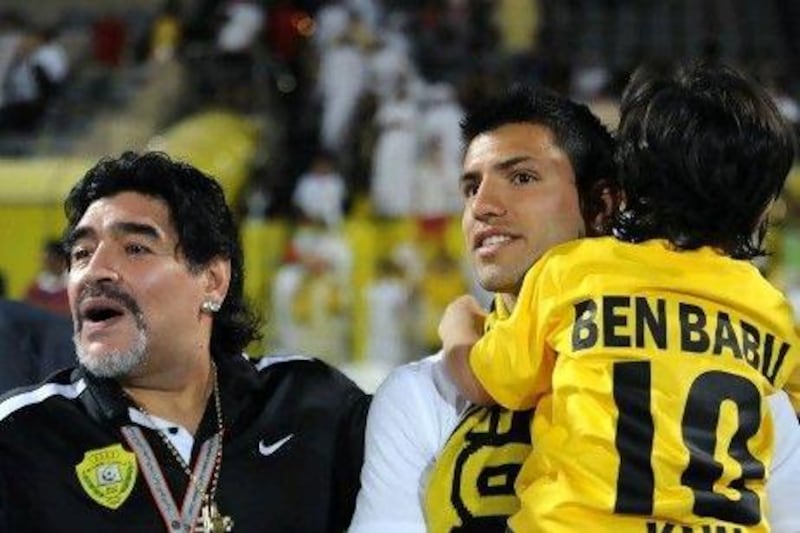One year ago yesterday, Al Wasl confirmed they and Diego Maradona had agreed on a two-season contract for him to coach the Pro League side.
With the benefit of 367 days of hindsight, it is safe to say Diego-and-Wasl has brought unprecedented global attention to the club and the league. It has not brought a breakthrough for Wasl on the pitch.
Neither development is surprising. Maradona remains an "A-list" celebrity but a football coach of modest achievements.
Wasl have been mentioned in countless news updates around the world this season. Granted, some of the stories were updates on Maradona's spat with Cosmin Olaroiu of Al Ain, his running feud with Pele, the ruckus in the stand at Al Shabab and his repeated calls for improvements to his squad.
But if we embrace the notion that "bad publicity" is an oxymoron, Maradona has been an unabashed success. Things were different on the pitch; the club's results declined slightly from a tepid 2010/11 season.
One season ago, Wasl won nine, drew four and lost nine in the league, good for 31 points and sixth place. Under Maradona, they have won seven, drawn five and lost nine (with one match to play), for 26 points and eighth place. They scored 31 goals and conceded 36 a year ago; it is 30 and 34 this term.
In 2010/11, Wasl reached the semi-finals of the President's Cup; this season it was the quarter-finals. They were Etisalat Cup semi-finalists both last season and this.
The cost-benefit analysis at Wasl has focused on the gains for the club's brand and improved corporate backing. Marwan bin Bayat, the club chairman, has suggested turnover at the club is nearly double what it was a year before.
Wasl away games certainly are more anticipated. The welcome at Al Wahda perhaps summed up Maradona's local appeal. Fans unfurled an enormous banner that read: "Maradona - the legend. Welcome to our country and stadium. You are the best ever. We all love you too much".
Wasl's away games produced an average crowd of 4,416, almost half again the average league attendance of just over 3,000. No fewer than five clubs (Baniyas, Ajman, Emirates, Al Nasr, Dubai) had their biggest crowds when Maradona's team provided the opposition.
The Argentine has given spectators value for money, as well. His outbursts have been so common and so intense as to warrant a "Diego cam" trained on his face at all times.
Wasl's season has not lacked for effort; Maradona's team seemed desperately eager to please him but unsure how to accomplish it. They ran and ran, and here at the end they just seemed to run down; Wasl have two points from their past five league matches, and have not won since March.
Mariano Donda was a revelation and Juan Manuel Olivera a dependable scorer. Rashid Essa was productive and Majed Naser was the league's best goalkeeper until he slapped Quique Sanchez Flores.
Maradona's year and a day with Wasl also seems to have brought him a better understanding of what is possible and what is not. The arc of his relationship with the club bears more than a passing resemblance to the "five stages of grief": denial, anger, bargaining, depression, acceptance.
The final stage apparently was reached during a three-hour meeting with the Wasl board last week, when club officials perhaps reminded him of the generous salary and upscale lifestyle he has in Dubai despite results that would have got another man fired months ago.
He left the meeting and said he would honour his contract.
Now he and Wasl go forward. Attempts will be made to improve the squad, and he will be consulted. A year from now, perhaps he will have burnished his lasting celebrity with a new trophy or two.





